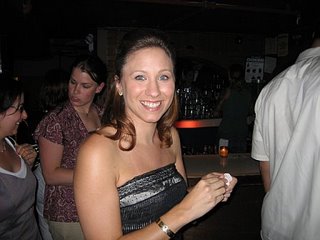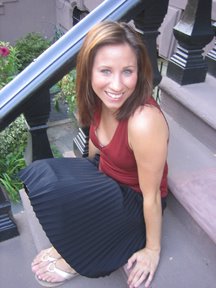From Scholastic.com
“This week at Scholastic headquarters in New York, Trade publishing editor Samantha Schutz told co–workers about some of her greatest personal struggles. No, this wasn’t an impromptu group therapy session, but a "Library Lunchtime Talk" during which Schutz gave one of the first public readings of I Don’t Want to Be Crazy, a poetry memoir about her struggle with anxiety disorder. Released this month under the Scholastic PUSH imprint, the book is already on The Poetry Foundation’s top ten Children’s Best Sellers list.
Introducing the Scholastic employee and first–time author, Scholastic editorial director and executive editor David Levithan said, “Some people use words to hide themselves, others to find themselves. Samantha has used words to find herself, and is brave enough to share them with others.” And share she did, reading poems that describe—sometimes breath to breath—the panic attacks that intensified during her freshman year in college. Based on journals she kept throughout her college years, the poems vividly convey what the experience of an anxiety attack is like—and describe how Schutz learned to cope, with help from campus health services, a therapist, and a psychiatrist.
Schutz recommends this very personal memoir to readers age 14 and up. She is currently talking with representatives of psychiatric associations, clinics, and other interested groups about how her book can be used as a tool to help the thousands of children and adolescents who have anxiety disorder.
You can read more about I Don’t Want To Be Crazy on scholastic.com, and check out her biography while you’re there. Samantha’s personal website has excerpts from her book, links to info resources on anxiety disorder and other mental health concerns, and news about her upcoming readings and events. You can also find out about the Scholastic PUSH imprint, which is dedicated to new authors and new voices, at thisispush.com.”
Friday, July 21, 2006
Friday, July 14, 2006
Thursday, July 13, 2006
This is my "People Have Problems...and So Do You" booklist.
I know I am forgetting some amazing books, but will add more soon. Feel free to add comments of other books I forgot.
Teen Angst? Naaah...: A Quasi-Autobiography
Ned Vizzini
A collection of essays written by the author from age fifteen to seventeen in which he shares impressions of school, sports, cool people, boring people, friends, family, money, music, and obsessions.
It's Kind of a Funny Story
Ned Vizzini
Craig Gilner is a gifted 15-year-old boy who works hard to get into a fiercely competitive high school, then crumbles under the intense academic pressure. Blindsided by his inability to excel and terrified by thoughts of suicide, Craig checks into a psychiatric hospital where he finally gets the help he needs.
Luna
Julie Anne Peters
"This novel sensitively portrays the life of a transgender teen through the eyes of a sympathetic younger sister," wrote PW.
Skin
Adrienne Maria Vrettos
Fourteen-year-old Donnie's older sister, Karen, has always been the one person in his life on whom he could totally depend. But as Karen slowly slips away in the grip of an eating disorder, Donnie finds himself alone in facing the trauma of his parents' faltering marriage and his new life as an outcast at school.
Burn Journals
Brent Runyon
Runyon's first-person account of his close brush with death and his painful rehabilitation is reminiscent of Girl, Interrupted and Running with Scissors.
Talking in the Dark
Billy Merrell
Merrell lays open the journal of his life, taking readers with him through his parents' divorce, his awakening sexuality, and his quest to find love and acceptance while discovering himself in the process.
Perfect
Natasha Friend
Following the death of her father, a thirteen-year-old uses bulimia as a way to avoid her mother's and ten-year-old sister's grief, as well as her own.
Cut
Patricia McCormick
While confined to a mental hospital, thirteen-year-old Callie slowly comes to understand some of the reasons behind her self-mutilation, and gradually starts to get better.
Crank
Ellen Hopkins
This devastating story, told in poetry, is even more frightening because it is based on the author's own experiences with her addicted daughter.
Wild Roses
Deb Caletti
Seventeen-year-old Cassie Morgan has a secret: She's living with a time bomb (a.k.a. her stepfather, Dino Cavalli). To the public, Dino is a world-renowned violinist and composer. To Cassie, he's an erratic, self-centered bully.
Stop Pretending: What Happened when My Big Sister Went Crazy
Sonya Sones
A younger sister has a difficult time adjusting to life after her older sister has a mental breakdown.
Speak
Laurie Halse Anderson
When Melinda Sordino's friends discover she called the police to quiet a party, they ostracize her, turning her into an outcast -- even among kids she barely knows. But even worse than the harsh conformity of high-school cliques is a secret that you have to hide.
Smack
Melvin Burgess
After running away from their troubled homes, two English teenagers move in with a group of squatters in the port city of Bristol and try to find ways to support their growing addiction to heroin.
Damage
Amanda M. Jenkins
Seventeen-year-old football hero Austin, trying to understand the inexplicable depression that has drained his interest in life, thinks that he has found relief in a girl who seems very special.
Shattering Glass
Gail Giles
When Rob, the charismatic leader of the senior class, turns the school nerd into Prince Charming, his actions lead to unexpected violence.
You Remind Me Of You
Eireann Corrigan
Struggling for years with eating disorders, in and out of treatment facilities, Eireann Corrigan is teetering on the brink of no return when her high school boyfriend attempts suicide.
Detour: My Bipolar Road Trip in 4-D
Lizzie Simon
What is it like to be "bipolar"? Lizzie Simon, a 23-year-old afflicted with this form of mental ailment, goes on a road trip in search of others like her and tells all in this frank and surprising memoir.
Kissing Doorknobs
Terry Spencer Hesser, A. J. Allen (Afterword)
Fourteen-year-old Tara describes how her increasingly strange compulsions begin to take over her life and affect her relationships with her family and friends.
Just Checking
Emily Colas
A frank and funny first-person account of living with obsessive-compulsive disorder.
Tuesday, July 11, 2006
panicdisorder.about.com gave me a really nice review. Thanks Cathleen!
"With raw honesty, Samantha Schutz tells of her personal struggles with panic disorder in I Don't Want to Be Crazy. Framing her journey within her years at college, Schutz writes of her experiences in verse. Easily accessible, the poetry engages the reader instantly and captures the intensity of life with panic disorder. While I Don't Want to Be Crazy often is emotionally painful, the underlying message is one of hope."
Pros
Writing style draws the reader in, from the start
Author's honesty about struggles and triumphs keeps the reader connected
The poetry is emotionally engaging, and the reader feels the author's ups and downs with her.
Cons
There really are no cons -- but readers seeking a "cure" may be disappointed
Description
A memoir written in verse, the book captures and relates emotion in ways that prose would not.
The author accurately depicts the intensity of panic, often inducing emotion in the reader.
For the young panic sufferer, Schutz's memoir provides insight and information.
Ultimately, the book is about asking for help. Schutz shows how she does it and why it's OK.
Guide Review
Samantha Schutz did not experience her first panic attack in college, but it was there that her attacks intensified enough to make her take notice. And then they intensified enough to change her way of living and her way of thinking about herself and the world.
I Don't Want to Be Crazy is Schutz's poetic account of her emotional journey from college freshman year to her first jobs after graduation. From the beginning, Schutz wrestles with many of the same hopes and fears every young person faces. Early in her freshman year, however, Schutz begins to experience intense panic attacks and has no idea what is happening until she winds up at her school's counseling center.
To a reader with an anxiety disorder, the most valuable aspect of I Don't Want to Be Crazy is the author's honesty. Schutz is truthful about every last fear she has, even when, in the past, she was sure she would be considered a "freak" should anyone know what was happening inside her. Schutz is truthful about therapy and medication; for her, there was no overnight cure, just as there isn't for many of us. Finally, Schutz is truthful about why she keeps fighting, about why she believes she is worth it.
I Don't Want to Be Crazy adeptly captures the pain and frustration of panic disorder in a way that captivates the reader from start to finish. At the same time, Schutz lets us know that there is hope:
"With raw honesty, Samantha Schutz tells of her personal struggles with panic disorder in I Don't Want to Be Crazy. Framing her journey within her years at college, Schutz writes of her experiences in verse. Easily accessible, the poetry engages the reader instantly and captures the intensity of life with panic disorder. While I Don't Want to Be Crazy often is emotionally painful, the underlying message is one of hope."
Pros
Writing style draws the reader in, from the start
Author's honesty about struggles and triumphs keeps the reader connected
The poetry is emotionally engaging, and the reader feels the author's ups and downs with her.
Cons
There really are no cons -- but readers seeking a "cure" may be disappointed
Description
A memoir written in verse, the book captures and relates emotion in ways that prose would not.
The author accurately depicts the intensity of panic, often inducing emotion in the reader.
For the young panic sufferer, Schutz's memoir provides insight and information.
Ultimately, the book is about asking for help. Schutz shows how she does it and why it's OK.
Guide Review
Samantha Schutz did not experience her first panic attack in college, but it was there that her attacks intensified enough to make her take notice. And then they intensified enough to change her way of living and her way of thinking about herself and the world.
I Don't Want to Be Crazy is Schutz's poetic account of her emotional journey from college freshman year to her first jobs after graduation. From the beginning, Schutz wrestles with many of the same hopes and fears every young person faces. Early in her freshman year, however, Schutz begins to experience intense panic attacks and has no idea what is happening until she winds up at her school's counseling center.
To a reader with an anxiety disorder, the most valuable aspect of I Don't Want to Be Crazy is the author's honesty. Schutz is truthful about every last fear she has, even when, in the past, she was sure she would be considered a "freak" should anyone know what was happening inside her. Schutz is truthful about therapy and medication; for her, there was no overnight cure, just as there isn't for many of us. Finally, Schutz is truthful about why she keeps fighting, about why she believes she is worth it.
I Don't Want to Be Crazy adeptly captures the pain and frustration of panic disorder in a way that captivates the reader from start to finish. At the same time, Schutz lets us know that there is hope:
Subscribe to:
Comments (Atom)





